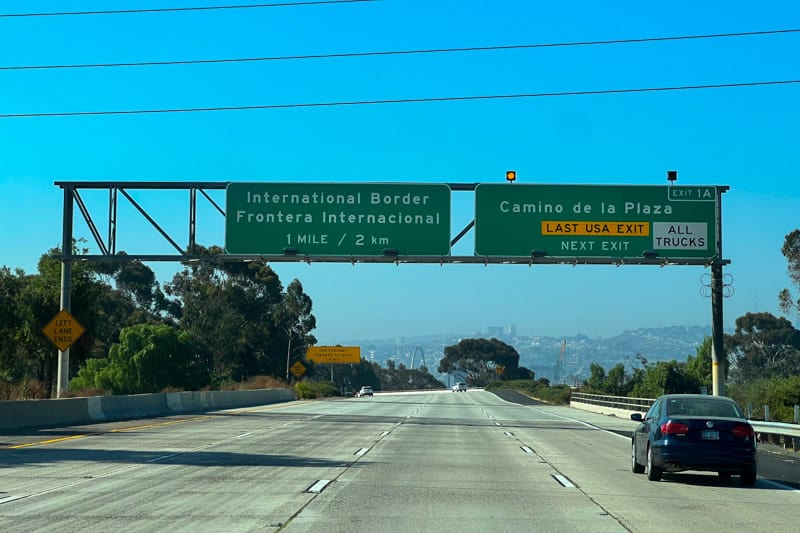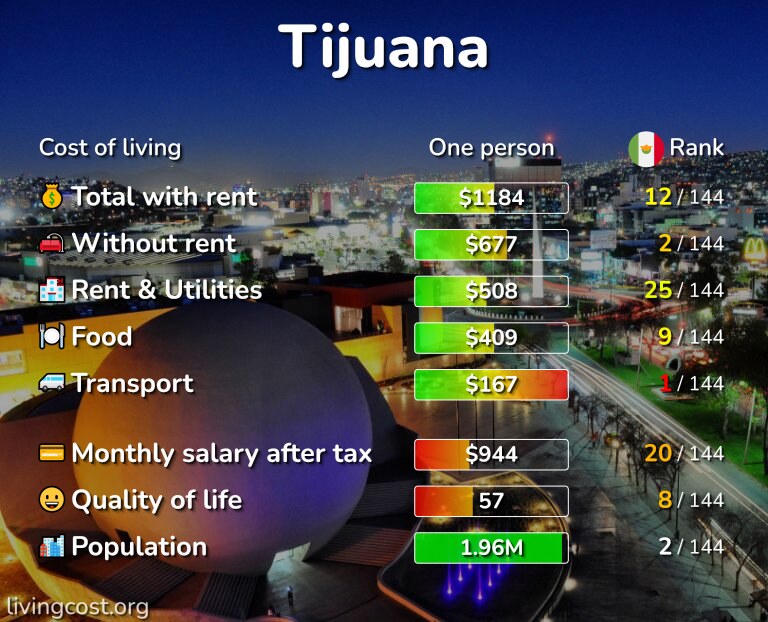Moving From San Diego To Tijuana
For many, the idea of crossing international borders to start a new life may seem daunting, but for those considering a move from San Diego to Tijuana, the benefits are undeniable. With its vibrant culture, rich history, and proximity to the US-Mexico border, Tijuana offers an attractive alternative to the high cost of living in San Diego. From a more affordable housing market to a thriving expat community, this Mexican city is quickly becoming a hotspot for Americans looking to trade in the surf and sun for a more laid-back, cost-effective lifestyle.

Oceanic Opportunities: Moving from San Diego to Tijuana
Are you considering a move from San Diego to Tijuana? This exciting opportunity can bring many benefits, from a lower cost of living to a rich cultural experience. However, it's essential to be prepared for the transition. Here are some key things to consider:
Cost of Living Differences
One of the most significant advantages of moving from San Diego to Tijuana is the lower cost of living. Housing, food, and transportation costs are significantly lower in Tijuana compared to San Diego. For example, a one-bedroom apartment in San Diego can cost around $1,800 per month, while a similar apartment in Tijuana can cost around $400 per month. Here's a breakdown of some typical costs in both cities:
| Category | San Diego | Tijuana |
|---|---|---|
| 1-bedroom apartment | $1,800/month | $400/month |
| Meal at a mid-range restaurant | $15-20 per person | $10-15 per person |
| Gasoline (1 liter) | $0.80 | $0.60 |
VISA Requirements and Residency
To move from San Diego to Tijuana, you'll need to obtain a visa or resident permit. The type of visa you'll need depends on your purpose for moving, such as work, study, or retirement. The most common types of visas are the FM2 (non-lucrative visa) and the FM3 (lucrative visa). You can apply for these visas at the Mexican consulate in San Diego or once you arrive in Tijuana.
Healthcare and Insurance
Mexico's healthcare system is well-regarded, with many high-quality hospitals and medical facilities. However, it's essential to have health insurance that covers you in Mexico. Many US insurance companies offer international coverage, or you can purchase insurance from a Mexican provider.
Culture Shock and Language Barriers
Moving to a new country can be a significant culture shock, especially if you're not fluent in Spanish. However, Tijuana is a city that's accustomed to welcoming expats, and many locals speak some English. You can also take language classes or hire a translator to help you navigate the city.
Taxes and Finances
As a US citizen, you'll need to consider the tax implications of moving to Mexico. You may be subject to taxes on your worldwide income, even if you're living in Mexico. It's essential to consult with a tax professional to understand your obligations. Additionally, you may need to open a Mexican bank account to manage your finances and pay bills.
How to move from San Diego to Tijuana?

Moving from San Diego to Tijuana: A Comprehensive Guide
Understanding the Process
Moving from San Diego to Tijuana can be a complex process, but with the right information, it can be made easier. The first step is to understand the process of obtaining the necessary documents and permits to live and work in Mexico. This includes obtaining a visa, registering with the Mexican government, and obtaining health insurance. It's essential to research and understand the requirements for your specific situation, whether you're a student, worker, or retiree.
Logistical Considerations
When planning your move, there are several logistical considerations to keep in mind. These include:
- Housing: Finding a place to live in Tijuana can be challenging, especially if you don't speak Spanish. Consider hiring a real estate agent who speaks English or working with a relocation service.
- Transportation: If you plan to bring your car, research the requirements for importing a vehicle into Mexico. Additionally, consider the cost and logistics of shipping your belongings.
- Finances: Understand the cost of living in Tijuana and how it compares to San Diego. Consider opening a Mexican bank account and researching financial institutions that cater to expats.
Preparing for Culture Shock
Moving to a new country can be a culture shock, and Tijuana is no exception. To prepare, research the local customs, traditions, and way of life. Consider taking Spanish lessons to improve your language skills and make the transition smoother. Additionally, be prepared for differences in food, traffic, and daily life.
- Learn about Tijuana's neighborhoods: Research the different neighborhoods in Tijuana, such as La Mesa, Playas de Tijuana, and Centro, to find the best fit for your lifestyle.
- Get familiar with local transportation: Understand the public transportation system in Tijuana, including buses and taxis, to get around the city easily.
- Be open-minded: Be prepared to adapt to new customs, food, and ways of life. Keep an open mind and be patient with yourself as you navigate the transition.
Is it worth going to Tijuana from San Diego?

Proximity and Accessibility
One of the primary reasons to visit Tijuana from San Diego is its proximity. The two cities are separated by a mere 17 miles, making it an easily accessible destination for a day trip or a longer stay. The San Ysidro-Tijuana border crossing is one of the busiest land border crossings in the world, with numerous transportation options available, including public buses, taxis, and ride-sharing services.
Cultural Experiences and Food
Tijuana offers a unique cultural experience, blending Mexican and American influences. The city is known for its vibrant arts scene, with numerous galleries and museums showcasing local talent. Visitors can also explore the historic Avenida Revolución, lined with shops, restaurants, and bars. When it comes to food, Tijuana is famous for its Baja-style tacos, featuring fresh seafood and traditional Mexican flavors. Additionally, the city is home to a thriving craft beer scene, with numerous breweries offering tours and tastings.
Shopping and Nightlife
Tijuana is a shopper's paradise, with a wide range of markets and shopping centers offering everything from traditional handicrafts to modern electronics. The Mercado Hidalgo is a must-visit, featuring an array of colorful stalls selling fresh produce, souvenirs, and local specialties. In the evenings, visitors can enjoy Tijuana's lively nightlife, with numerous bars, clubs, and lounges offering a range of music and entertainment options.
Some popular activities to consider in Tijuana include:
- Visiting the Casa de la Cultura, a historic building turned cultural center featuring exhibitions and performances.
- Exploring the Cañón del Azul, a scenic canyon with hiking trails and stunning views.
- Taking a tequila tour, learning about the production process and sampling some of Mexico's finest spirits.
How much money do I need to move to Tijuana?

The cost of moving to Tijuana can vary greatly depending on several factors, including your lifestyle, accommodation choices, and personal preferences. Here are some estimated expenses to consider:
Initial Expenses
Visa and Immigration Fees
To move to Tijuana, you may need to apply for a visa or residency permit. The cost of these fees can range from $300 to $1,000, depending on the type of visa you need and your country of origin. Additionally, you may need to pay for document translation, authentication, and apostille services, which can add up to $200 to $500.
Some required documents may include:
+ Passport
+ Birth certificate
+ Marriage certificate (if applicable)
+ Divorce or death certificate (if applicable)
+ Proof of income or financial resources
The cost of obtaining these documents can vary depending on your country of origin and the authentication process.
Housing and Rent
Finding a place to live in Tijuana can be challenging, especially if you're looking for a furnished apartment or house. Rent prices vary depending on the location, size, and amenities. On average, you can expect to pay:
+ $400 to $800 per month for a one-bedroom apartment
+ $600 to $1,200 per month for a two-bedroom apartment
+ $1,000 to $2,000 per month for a three-bedroom house
You may also need to pay a security deposit, which is usually equivalent to one or two months' rent.
Living Expenses and Daily Costs
The cost of living in Tijuana is relatively low compared to other major cities in Mexico. Here are some estimated daily expenses:
+ Food: $10 to $20 per meal
+ Transportation: $5 to $10 per day
+ Utilities (electricity, water, internet): $100 to $200 per month
+ Healthcare: $50 to $100 per month (depending on your insurance coverage)
To live comfortably in Tijuana, you may need to budget at least $2,000 to $3,000 per month, depending on your lifestyle and personal preferences.
Is living in Tijuana worth it?

While considering moving to Tijuana, it's essential to weigh the pros and cons of living in this Mexican city. Tijuana is a vibrant and bustling metropolis with a rich cultural scene, delicious cuisine, and a unique blend of Mexican and American influences. However, it also faces challenges related to crime, safety, and environmental issues.
Cost of Living in Tijuana
The cost of living in Tijuana is generally lower compared to other major cities in Mexico. Rent, in particular, is affordable, with options ranging from $200 to $500 per month for a one-bedroom apartment in a safe neighborhood. Additionally, food and transportation costs are also relatively low. Here are some examples:
- A meal at a mid-range restaurant costs around $10-$15 per person.
- A liter of milk costs approximately $0.60.
- A monthly public transportation pass costs around $20.
Job Opportunities and Economy in Tijuana
Tijuana has a thriving economy, with a strong focus on manufacturing, tourism, and technology. The city is home to numerous maquiladoras ( manufacturing facilities) that produce goods for export, creating a high demand for skilled workers. Additionally, Tijuana's proximity to the US-Mexico border makes it an attractive location for startups and entrepreneurs. Some key industries in Tijuana include:
- Aerospace and defense
- Electronics and telecommunications
- Medical devices and biotechnology
Quality of Life and Safety in Tijuana
While Tijuana has made significant progress in terms of security and safety, it's still essential to exercise caution when living in the city. Crime rates have decreased in recent years, but petty theft and gang-related violence can still occur. To ensure a safe and enjoyable experience, it's crucial to:
- Live in a safe and well-lit neighborhood.
- Avoid traveling alone at night.
- Stay informed about local events and demonstrations.
FAQ
What are the necessary documents required to move from San Diego to Tijuana?
When moving from San Diego to Tijuana, it's essential to have all the necessary documents in order to avoid any complications during the process. Valid passport: Make sure your passport is up to date and has at least six months' validity. FM3 or FM2 visa: Depending on your nationality and the purpose of your move, you may need to apply for an FM3 (non-immigrant) or FM2 (immigrant) visa. Birth certificate: You may need to provide a certified copy of your birth certificate, especially if you're planning to bring children or pets with you. Proof of income: You may be required to show proof of income or financial stability to demonstrate that you can support yourself in Mexico.
The cost of living in Tijuana is generally lower compared to San Diego, but it's crucial to understand the differences to ensure a smooth transition. Housing: Rent or buying a property in Tijuana can be significantly cheaper than in San Diego. Food: Eating out or buying groceries in Tijuana can be up to 50% cheaper than in San Diego. Transportation: Owning a car in Tijuana may be more affordable, but public transportation is also efficient and inexpensive. Healthcare: Mexico offers affordable healthcare options, but it's essential to research and understand the differences in healthcare systems between the two cities.
What are the best neighborhoods to live in Tijuana for expats?
Tijuana has various neighborhoods that cater to expats, each with its unique character and advantages. Zona Rio: This upscale neighborhood offers modern amenities, shopping centers, and easy access to the US-Mexico border. Playas de Tijuana: This coastal neighborhood provides a laid-back beach lifestyle, with many amenities and services catering to expats. La Mesa: This neighborhood offers a mix of old and new, with a blend of traditional Mexican culture and modern amenities. Centro: The city center is ideal for those who want to be close to the action, with many cultural attractions, restaurants, and shops within walking distance.
How do I find a job or start a business in Tijuana as an expat?
As an expat, finding a job or starting a business in Tijuana can be challenging, but there are opportunities available. Teaching English: With many language schools and universities, teaching English can be a viable option. Remote work: Tijuana has a growing remote worker community, with many coworking spaces and amenities catering to digital nomads. Entrepreneurship: Starting a business in Tijuana can be rewarding, with many opportunities in industries like tourism, manufacturing, and services. Networking: Attend expat events, join online communities, and connect with local business owners to build relationships and find opportunities.
